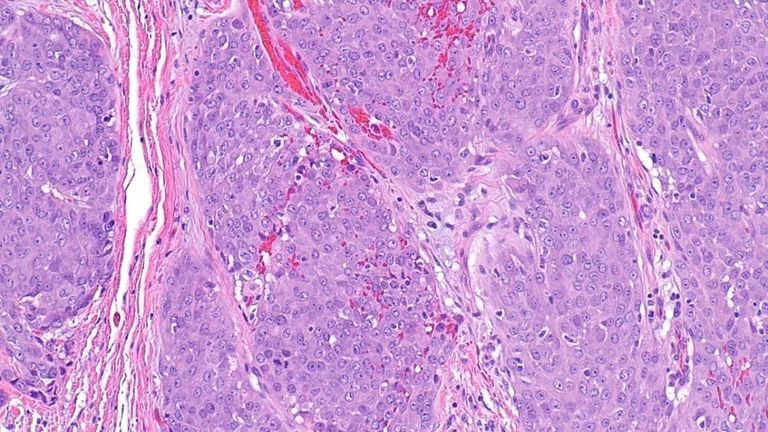Deadly cat virus in Cyprus could be ‘potentially catastrophic for UK’ | World News
A deadly outbreak of feline coronavirus that has killed hundreds of thousands of cats in Cyprus could be “catastrophic” if it were to reach the UK, an expert has told Sky News.
Around 300,000 cats – both domestic and stray – have died of feline infectious peritonitis (FIP) on the island since January, according to Dinos Ayiomamitis, head of Cats PAWS Cyprus.
Britain has a long history with Cyprus, with ex-pats travelling to and from the island and many people rehoming cats to the UK.
But what is FIP, why have so many cats died – and is there a risk of an outbreak in the UK?
What is the disease that is killing cats?
FIP is a disease caused by feline coronavirus (FCoV).
FCoV is a common and contagious virus in cats that is spread through their faeces. Most cats will not show symptoms, and if they do it is limited to mild diarrhoea.
But in some cases, the virus mutates into FIP, which is almost always fatal.
Dr Jo Lewis, a feline veterinary surgeon, told Sky News “infection rates tend to be highest in cats living in close quarters and sharing toileting facilities”, like catteries and rescue centres, for example.
“It’s also important to note that the virus can be transmitted mechanically on grooming brushes, cat litter scoops and even on human feet and hands,” says the author of What’s My Cat Thinking?.
“That theory may explain why many indoor-only cats in Cyprus are being affected.”
Dr Nathalie Dowgray, head of the International Society of Feline Medicine, said the outbreak was “very concerning” for cats, cat owners and vets in Cyprus.
“For many, including stray cats, treatment will likely not be possible and sadly this will likely result in significant mortality.”
Whether a cat gets FIP or not depends on the “types of mutations, the load of virus and individual cat immune system”, Dr Dowgray said.
What are the symptoms of FIP?
FIP is hard to diagnose but most cats with the virus will have a fever, appear lethargic and go off their food.
There are two types of the virus – wet FIP and dry FIP.
In cats with the former, fluid builds up in the abdomen or chest, causing swelling.
“We tend to see cats presenting with a large fluid-filled belly and breathing difficulties, who are increasingly lethargic and picky with their food,” Dr Lewis said.
Cats with dry FIP have less fluid build-up but may have a poor appetite, high temperature and vision problems.
FIP is more likely to develop in young cats between three months and two years old.
Why has there been a FIP outbreak in Cyprus?
Cyprus is known as the “island of cats”.
Strays roam everywhere and the earliest evidence of cats being domesticated was found there, in a 9,500-year-old burial site.
Feline coronavirus spreads via cat faeces. Where there are lots of cats in the same place, the chances of cats catching it are higher, and experts have also found the virus is more likely to mutate into FIP.
Cats’ stress levels are also high when they live in crowded shelters, which could make them more susceptible to developing FIP.
How significant is this outbreak?
Generally, FIP is only reported in about 1% of the cat population, but in outbreaks such as the one in Cyprus, up to 40-50% of cats could develop FIP.
Dr Lewis said: “What’s concerning about the evidence from the Cyprus outbreak, is that a particularly nasty FCoV mutation seems to have already occurred.”
‘The risk to UK cats is significant’
An outbreak of this size is said to have not been seen anywhere before, so if it reaches the UK it could be quite serious and will weigh heavily on the minds of cat owners and vets.
Dr Lewis told Sky News: “There’s a genuine risk that if this gets into the UK it could have catastrophic consequences on our favourite pets.
“Anyone who has witnessed FIP heartache first-hand will understand the potential impact.”
The biggest risk to cats in Britain is importing the animals.
“We have a long history with Cyprus and plenty of British expats live and travel back and forth so the risk to UK cats is significant,” Dr Lewis added.
“We need to limit that risk by screening any cats leaving Cyprus and any nearby affected countries.”
She said cats leaving the island should be examined and blood tested for FCoV antibody levels, and any cat with symptoms shouldn’t travel.
Read more:
Arrest after cat thrown off cliff
Cats as good as dogs at helping us relax
Can FIP spread to humans?
No, humans cannot catch feline coronavirus and therefore cannot develop FIP.
How is it treated and how costly is it?
Dr Lewis said until recently there were very few treatment options available for FIP, which meant most cats who developed it were put down, and there’s also no vaccine in the UK.
“However, now there are now some, albeit very expensive, options that are available here in the UK – like remdesivir injections that are also used for humans with COVID-19, and a similar drug called GS-441524, an oral tablet.
“Unfortunately, the million cats living in Cyprus do not yet have access to these drugs.”
GS-441524 could be imported to Cyprus from the UK, but it is expensive – €3,000-€7,000 (£2,500-£6,000) per cat.
Anti-viral pill molnupiravir has also been considered as a treatment option, but it has not been licensed for feline use in Cyprus.



